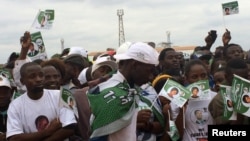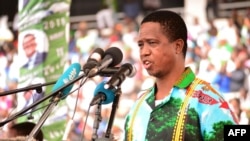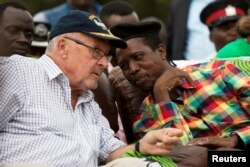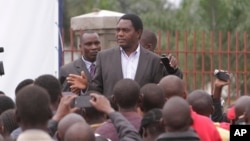Violence hangs like an ominous cloud over national elections in Zambia, a copper-rich, landlocked southern African nation that has been recently battered by drought and economic woes.
Incumbent President Edgar Lungu of the ruling Patriotic Front party (PF) faces a serious challenge from opposition leader Hakainde Hichilema from the United Party for National Development (UPND) in Thursday’s presidential vote. Lungu, who is widely considered a populist, narrowly beat Hichilema, a businessman, in a January 2015 snap election held after the sudden death of President Michael Sata.
This year’s election campaign has been marred with multiple clashes between supporters of the two main parties, prompting the head of the electoral commission to call the violence “unprecedented.” Unlike its southern African neighbors, Zambia has long been hailed as a bedrock of peace and democracy.
‘Risk of violence is very high’
Many analysts say the presidential race is too close to call, but they agree on one grim prediction.
“The risk of violence is very high,” analyst Dimpho Motsamai told journalists at the Institute of Security Studies in Pretoria, South Africa.
“The political violence is coming from both sides; that is very important to highlight. It is coming both from the PF and the UPND in particular. It really speaks about a politics that is very unhealthy; the relationship between the opposition and the government, it’s just a very unhealthy political relationship, it’s very antagonistic, and anything that happens is dealt with in a very antagonistic fashion,” Motsamai said.
Lungu’s predecessor, Guy Scott, was Sata’s vice-president and is no friend of Lungu. During Scott’s short tenure as acting president after Sata’s death, he fired Lungu from his post as secretary-general of the ruling party. He recently endorsed Hichilema.
Scott was deemed ineligible to contest the election because the constitution requires that both parents of presidential candidates are Zambian “by birth or descent.” Scott, a Zambian citizen, is white and was born to British parents.
‘Do or die’ moment for Zambia
Scott struggled to pinpoint why a nation praised for peace, and which watched with horror its neighbors’ political strife, is now struggling. He said, it boils down to bad economics and poor leadership. In the past year, copper prices have fallen and food prices have risen amid a crippling drought, all tinder for a fire of discontent.
“Why it’s gone so bad, it’s hard to say, I think,” he told VOA News by phone from Lusaka. “People were upset at Mr. Sata’s death, they were upset at the people running around with knives and guns, and they were unhappy with the economic downturn, of course, last year, which has still failed to right itself in Zambia and which has led to a lot of unemployment and has strengthened the elite at the cost of the poor. It has a vaguely Venezuelan flavor to it, in that respect.”
Motsamai says the vote could be a “do or die” moment for Zambia. The tension is also heightened by new election rules that say the winner needs to gain more than 50 percent of the vote to win without a runoff.
“A lot of hopes are hanging on the candidates to do the right thing once they are in office. But also, the presidential race is particularly a tight one,” Motsamai said. “UPND in the last election went quite far, they in fact said the elections were rigged. They are unlikely to concede defeat without a fight.”







